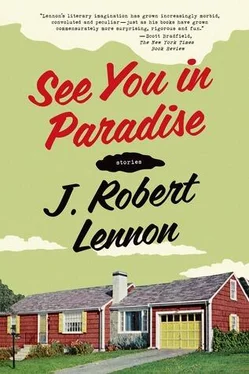Heather and Bruce are still here because they didn’t know the storm was coming. They don’t have a television or computer. They have been living at the restaurant for six months, since their late parents’ house burned down. Heather has been sleeping in the storeroom. Bruce has been sleeping in their truck. They’re running out of money. They are only dimly aware of this.
There’s something wrong with them, but nobody in the county knows what it is. Drugs, maybe. Their parents were strange, too, even when they were running the Buck Snort at full capacity, liquor license and all. Every morning at nine Bruce illuminates the neon OPEN sign in the window, and every night at ten he turns it off. When somebody comes in, he hands them a menu and walks away. If they stay long enough to order, Heather tries to cook what they ask for. Usually the customer doesn’t eat it. Usually they leave without paying. Sometimes somebody pays without eating. No one ever eats and then pays.
At a quarter to nine, a car pulls into the parking lot. It’s a late-model Toyota containing a diminutive couple in their early fifties. Their faces suggest that they are quite terrified by the rain and wind and are relieved to have found an open restaurant. They both wear glasses and outdoorsy clothes that appear new. They converse for a moment, gesticulating wildly, then, in a coordinated effort, fling open the car doors, leap out, slam the doors behind them, and run for the entrance of the Buck Snort. Inside the foyer, they assess one another’s appearance. They have only been exposed to the elements for four or five seconds, but they are drenched. The man holds up the car key fob and presses a button. Outside, the car’s headlights blink twice and the horn sounds. Now they turn and enter the restaurant.
Here is what they see: a large, lodge-like room decorated with paintings, or posters of paintings, of bears, eagles, and deer, and furnished with a collection of rustic wooden tables and chairs. A man and a woman sit at two of the tables, each surrounded by a collection of some kind of refuse. The man is heavily bearded and of indeterminate middle age. The woman’s hair is long and dirty, and she gives the impression, confusingly, of also having a beard, even though she doesn’t. She is also in her late thirties or early forties.
The man and woman look very similar and wear similar expressions of puzzlement at the sight of the diminutive couple.
The diminutive couple detects a foul odor in the Buck Snort, perhaps a number of foul odors mingled into one. They look at each other, then back, out the window, at their car being battered by rain and wind. They seem to arrive at a decision and step fully into the dining area of the restaurant.
“Evening!” the diminutive man says brightly. He removes his glasses and wipes them dry with a cloth taken from his pants pocket. His name is Roy. The diminutive woman does the same to her glasses, with a similar cloth. Her name is Fern.
A few moments pass. Bruce and Heather have not responded, but they are still looking at Fern and Roy. So Roy tries again. “Glad to see you were open,” he says. “We were caught out in the storm.” He has to shout over the sound of the wind, and because his own voice, even in a quiet room, doesn’t carry. His mother taught him this: “You’ll need to shout, little Roy! A little man like you will have to work to be noticed.” She was right — Roy’s loud talking, combined with his small stature, have always made him a figure of fun among his students, but they pay him the necessary respect. He is a professor of veterinary science.
For her own part, Fern usually does most of the talking when they are together, as she is a talker. But not tonight. She is wary. If it weren’t for the storm, she would have turned and left immediately upon seeing Heather and Bruce. Fern owns a yarn shop. She believes that it has given her great insight into the human condition. She is correct.
Fern and Roy have been fishing here in the greater Banner area. They live in Pennsylvania. Their fishing trips are frequent and deeply pleasurable, and the only times when they have sex. On this trip, before the storm, they caught many bass and had sex several times. They were so absorbed in these activities that they failed to listen to the weather report. That’s why they’re stuck here with Bruce and Heather.
Bruce gets up.
Bruce walks to the hostess station, which is right near where Fern and Roy are standing. Fern and Roy both take a step back. Bruce takes two menus from a wooden holder and moves to the table that is at the farthest equidistant point in the room from his and Heather’s two tables. He sets the menus down and then he returns to his seat, where he glues, with great precision, a tiny off-white license plate to the back of his model sports car. Within seconds, he has completely forgotten the existence of Fern and Roy.
Heather has not. She would appear, from Fern and Roy’s point of view, to be watching them hungrily.
Fern and Roy walk to the table Bruce put the menus on and sit down beside each other. This is how they sit in restuarants. Some people find this charming, other find it irritating. Roy is bothered by people’s judgment in this matter. Fern is not. Eighteen years with her mother, that degenerate witch, taught her that other people’s judgment is typically worthless and self-serving. Roy is the only person she trusts, will ever trust. This restaurant, she does not trust. The menus are simple inkjet-printed pieces of paper. They haven’t been laminated. Food and drink stains have obscured much of the text, so that Fern and Roy must cross-reference each other’s copies in order to read it. Their jerking heads and darting eyes would probably look comic to anyone watching besides Heather, but only Heather is watching.
There is nothing on the menu that Fern and Roy want to eat.
Roy says, “Maybe we should leave.”
“The storm.”
“We could sit in the car with the doors locked.”
“That’s true.”
“Do you think they’re dangerous?”
Fern narrows her eyes. “No. Maybe.”
“I think we should leave,” Roy says.
“Perhaps. Perhaps we should.”
But before they can, Heather stands up and hurries across the room. Glides might be the better verb. Heather glides to their table, her heavy dress billowing out behind her. It is a kind of muumuu, brown and burlappy, giant pockets bulging with something or other, even Heather couldn’t tell you what, if you asked. Fern imagines that she inherited this garment from her mother, and she is right. Heather gazes at Fern, then Roy, then says, “So?”
“Ah …” says Roy.
“We’re not hungry,” says Fern, and holds out her menu to Heather. Heather does not take it.
“Maybe we could have some coffee,” says Roy.
“No coffee,” says Heather.
Fern is still holding out the menu and Heather is still not taking it. “How about some tea, then?” Fern asks.
Heather’s jaw works. She seems to be chewing on the idea of tea. She emits a low hum, almost a growl, as though something inside her is shorting out. She glides away to Bruce’s table, leans over him. They confer in low voices.
Fern has not lowered her arm. It’s sticking straight out, holding the menu toward where Heather was standing a moment ago.
Roy says, quietly, “Are they twins?”
“Yes.”
Heather returns. She says, “Fine,” then takes the menu out of Fern’s hand, and the other menu from the table in front of Roy, and then moves toward a darkened area of the restaurant that Fern supposes must be the kitchen. Roy thinks, it’s the dress that makes her appear to glide. It nearly reaches the floor and it billows when she walks. She is like a hovercraft. Before she disappears into the darkness he sees her crumple the menus and throw them onto the floor.
Читать дальше












